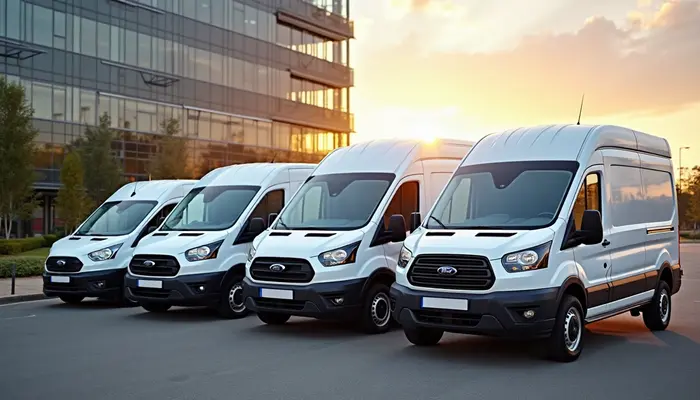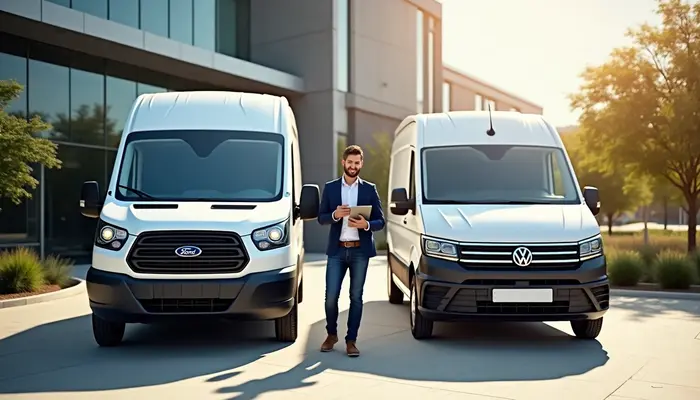Smart UK businesses choose van leasing to manage their vehicle needs these days. A brand-new commercial vehicle could be yours for just £100 per month, without the big cash investment that buying demands. The UK economy relies heavily on vans and commercial vehicles, yet business owners often struggle between leasing and buying decisions. See source of our van leasing info
Our 15 years in the van leasing industry have taught us a lot about helping businesses find affordable vehicle solutions. The popularity of business van leasing keeps growing, and the reasons are clear to see. Your business can benefit from predictable monthly payments that make budgeting easier. You won’t need to worry about depreciation costs, and VAT-registered companies enjoy substantial tax benefits. On top of that, VAT-registered businesses can claim back 100% of the VAT when they use the van purely for business.
In this piece, we’ll show you why UK van leasing options might work better for your business than buying outright. Let us guide you through everything you need to know about lease van deals and business van leasing, whether you’re new to leasing or looking for your next vehicle.
Why van leasing is gaining popularity in the UK
The UK’s commercial vehicle world van leasing has changed by a lot over the last several years. More businesses now lease vans instead of buying them outright. This trend shows how companies think differently about getting vehicles and managing their money.
Van Leasing vs buying: what’s the difference?
The biggest difference between leasing and buying comes down to ownership. You pay the full amount upfront (or finance it) when you buy a van and own it completely. Leasing works differently – you pay a monthly fee to use the vehicle for a specific time period.
A lease lets you rent the van for a set period, usually two to five years. You give the van back to the leasing company when your contract ends. This setup gives you more financial flexibility than buying because you don’t have to spend a large amount of money upfront.
Most lease agreements come with maintenance packages that cover regular service and repairs during your contract. You won’t have to worry about maintenance costs or losing value on your vehicle – unlike when you own it outright.
Trends in business van leasing
The numbers tell an interesting story about van leasing. Short-term van leasing exploded by 2,617% in 2024 compared to last year. Businesses asking about 18-month leases jumped from 0.6% to 16% of all inquiries.
Monthly payments for business van leases became cheaper as a result. They dropped 15% to £317.67 in 2024. These lower costs made short-term options more appealing to businesses that want flexibility.
Ready-to-go vehicles have become more popular too. About 59% of customers now pick in-stock vans instead of ordering from the factory, up from 37% last year. This shows that businesses just need quick access to vehicles without long wait times.

Operating leases now make up almost 90% of the market, growing from 86.6% to 88.4% year-over-year. Businesses clearly prefer letting leasing companies take the risk on the vehicle’s future value.
Why more SMEs are choosing Van leasing
Small and medium enterprises find van leasing attractive for several reasons. The lower upfront costs free up money for other vital business investments.
Fixed monthly payments help businesses manage their cash flow better – this is vital for growing companies that don’t have steady income. VAT-registered businesses get an extra benefit: they can reclaim 100% of the VAT on van leasing if they use the vehicle only for business. See electric van lease
SMEs really value these benefits:
- Preservation of working capital: Leasing saves you from spending big money upfront so you can use funds for activities that make money
- Protection from depreciation: Leased vans don’t lose value on your books like purchased vehicles do
- Operational flexibility: You can easily upgrade to newer models or change your fleet size as your business grows without selling owned vehicles
Businesses that depend heavily on transportation get the most value from van leasing. This includes delivery services, plumbing, construction, and manufacturing companies. They can maintain reliable fleets without using up their capital.
Top financial benefits of leasing a van
Money matters drive business decisions. The numbers make a strong case when we talk about commercial vehicles. Van leasing brings financial perks that go nowhere near just the original purchase price. Businesses of any size can get strategic money benefits throughout their agreement. See small van lease
Lower upfront costs and fixed monthly payments
Van leasing’s biggest money advantage is its smaller upfront cost. Buying a van needs big capital upfront. You just need an initial payment of about 3-6 monthly instalments with leasing. This keeps your business capital free to invest in growth and development elsewhere.
More importantly, van leasing gives you predictable costs through fixed monthly payments that stay the same during your agreement. This steady payment helps you budget precisely without worrying about surprise costs. Businesses that see ups and downs in income or seasonal demand find these predictable monthly costs extra helpful for planning finances. See ford van lease
My clients tell me that smaller initial costs and fixed payments make it easier to get quality commercial vehicles without putting too much strain on their business finances.
No depreciation worries
Vehicle ownership comes with a hidden cost – depreciation. Your van loses value as it gets older. Vans lose value faster in their first few years. This creates a big financial burden if you buy the van outright.
Leasing removes this financial risk completely. You pay only for the van’s value you use during the lease term (usually 2-4 years). The leasing company takes care of the van’s remaining value. You can return the van when your agreement ends and avoid any loss from selling a used vehicle.
This means the leasing provider, not your business, takes on the financial risk of depreciation – a huge plus in today’s uncertain economy.
Tax advantages for VAT-registered businesses
Van leasing comes with tax benefits that help your bottom line:
- VAT reclamation: VAT-registered businesses can get back 100% of the VAT on lease payments for vans used only for business. You might still get back 20-50% of the VAT even with some personal use.
- Tax-deductible expense: Your monthly lease payments count as business expenses for tax deduction. This cuts down your taxable profits when figuring out corporation tax.
- Capital preservation: Leasing keeps vans off your balance sheet, unlike buying. This gives you more financial flexibility.
These tax perks make van leasing look better than buying outright. It’s like getting a government discount on your commercial vehicle costs.
Better cash flow management
Good cash flow management creates the foundations of business success. Van leasing helps create healthier financial operations. Small upfront costs and predictable monthly payments make your business finances more stable.
Growing companies see even bigger benefits from better cash flow. Instead of locking up working capital in vehicles that lose value, leasing lets you keep money available for business opportunities or tough times.
Maintenance-inclusive lease agreements also remove surprise repair costs, which adds to financial predictability. This all-encompassing approach to vehicle expenses helps you plan finances better. You can forecast and budget with more accuracy.
Businesses switching from buying to leasing vans tell me they have better financial flexibility. They also use their available capital more strategically.
Flexibility and convenience for growing businesses
Growing businesses just need operational agility. Static vehicle ownership often can’t deliver this. Van leasing shines here by offering exceptional flexibility that adapts to your business needs.
Customisable lease terms and mileage
Van leasing puts you in control with flexible agreements, unlike the strict rules of vehicle ownership. You can choose lease durations between 2-5 years to match your business plans. Short-term leases from one month to two years give you more options if your business changes faster.
You can customise mileage allowances based on your operations. Most providers ask for at least 5,000 miles per year. Monthly payments work around your cash flow. Your original payment amount affects your monthly costs, which helps arrange payments that work for your business.
Many leasing providers also offer maintenance packages to make vehicle management easier. These extras cover routine servicing and repairs. You won’t have to worry about tracking maintenance schedules anymore.
Easy upgrades to newer models
Growing businesses love van leasing because knowing how to upgrade vehicles becomes simple. You can switch to a newer model with better technology, fuel efficiency, and improved safety features when your lease ends.
Your business always runs with modern, reliable vehicles thanks to this regular refresh cycle. This can get pricey in competitive industries where vehicle downtime hurts. Your fleet grows with your company instead of being limited by vehicles you bought earlier.
No hassle of selling the van later
Van leasing’s hidden gem is skipping the tedious process of selling used vehicles. You return the van to the leasing company when your lease ends. No more advertising, negotiating with buyers, or worrying about fair value for a depreciated asset.
This becomes even more valuable when you manage multiple vehicles. Fleet leasing lets you combine several vans under one contract. All vehicles follow the same simplified return process at the end.
This flexibility is a great way to get results for growing businesses or those with changing needs. You’ll never get stuck with the wrong vehicles or have to sell at a loss. Instead, you can adjust your fleet to match your business needs as long as you follow your lease agreement’s terms.
How van leasing works: a step-by-step guide
The process of securing a van lease becomes simple when you know the right steps. Let me guide you through everything – from picking your vehicle to getting your new business van delivered.
1. Choose your van and contract
You’ll need to pick a make and model that fits your business needs. Take time to look through the many van leasing deals from different providers. The next step is deciding which lease agreement works best for you – options like Business Contract Hire (BCH) and Finance Lease are common. Lease terms usually run between 2-5 years. Shorter terms give you more flexibility but might cost more each month.
2. Set your mileage and initial payment
Your van lease UK agreement needs an estimate of yearly mileage. This number sets your mileage allowance for the entire lease period. Make sure your estimate is realistic – a low estimate could mean extra charges later. Most providers let you make an upfront payment equal to 3, 6, 9 or 12 monthly payments. A bigger upfront payment means lower monthly costs.
3. Add optional maintenance packages
A maintenance package could be a smart addition to your business van leasing agreement. These packages cover scheduled servicing, MOTs, normal wear and tear replacements, and sometimes breakdown help. The payment structure matches your main lease – a 9+35 lease profile means your maintenance follows the same pattern. These packages are a great way to get peace of mind and avoid surprise repair costs.
4. Get your van delivered
Your van gets delivered to your location after paperwork and credit checks are complete. Delivery times depend on availability. In-stock vehicles usually take 1-3 weeks, while factory orders need about 12 weeks. Make sure you check the vehicle carefully for any damage before you sign the delivery note. After signing, you become responsible for any unmarked issues. Mainland UK addresses get free delivery.
When leasing makes more sense than buying
The financial benefits of van leasing are clear, and some business scenarios make it a exceptionally logical choice. Let’s get into specific situations where leasing beats purchasing as a strategic business decision.
Short-term needs or project-based work
Businesses with temporary vehicle needs find short-term leasing incredibly flexible. You can get contracts from 84 days to 18 months without any long-term commitment. This works great for seasonal operations that see periodic spikes or businesses waiting for their permanent leased vehicles.
Short-term van lease deals help businesses through transitional phases. You might be testing a new service area, handling a one-off project, or unsure about your long-term vehicle needs. These agreements bridge the gap between daily rentals and multi-year commitments.
Fleet management for multiple vehicles
Fleet van leasing makes managing multiple vehicles faster and easier. Your entire commercial vehicle operation stays under one agreement. This creates a more streamlined process and often leads to better rates.
Fleet leasing gives you these benefits:
- Simple administration with similar terms and renewal dates for your fleet
- Better budgeting through fixed monthly payments for all vehicles
- Simple maintenance management with inclusive packages
We focused on fleet leasing because it gives businesses unprecedented flexibility. You can add vehicles during the lease term or change your fleet mix when contracts renew.
Access to electric vans without long-term commitment
Many businesses see switching to electric commercial vehicles as a big step. Leasing offers a great path to electrification without huge capital investment or long-term commitment.
Electric vans come with clear advantages – lower running costs, less maintenance, and freedom from congestion charges including ULEZ. The technology keeps getting better faster. Leasing lets your business enjoy these benefits while staying free to upgrade as newer, more efficient models become accessible.
FlexiHire’s short-term leasing options give businesses a low-risk way to try electric vans before making longer-term decisions.
Conclusion
Conclusion: Make the smart choice for your business
Van leasing gives UK businesses clear advantages over buying vehicles outright. This piece shows how leasing saves money and gives companies the flexibility they want to grow and succeed.
Money is tight for companies big and small. Leasing tackles these money problems head-on. You’ll keep more working capital with lower original costs and plan better with fixed monthly payments. You won’t have to worry about losing money through depreciation – a major headache that comes with owning vehicles.
The tax benefits make leasing even more attractive. VAT-registered companies can get back up to 100% of their VAT on lease payments for vans used only for business. These savings add up over your lease term.
Flexibility is a vital advantage too. You don’t have to stick with vehicles that might not fit your future plans. Your fleet can grow as your business does. The end of your lease is simple – just return the vehicle without selling hassles or surprise costs.
Short-term leasing has taken off, with a massive 2,600% jump in 2024 compared to past years. This shows how much businesses value getting quality vehicles without long commitments.
The move to electric vehicles gives you another good reason to think over leasing. Electric van technology improves faster all the time. Leasing lets you drive the latest models without getting stuck with outdated ones.
We’ve helped countless businesses find the right van leasing deals in the last 15 years. We’ve seen how this approach turns vehicle management from a cost burden into a business advantage. Predictable costs, tax benefits, and easy flexibility make van leasing the smarter choice for UK businesses looking ahead.
Take time to look at what your business wants and needs before you decide. Leasing works great for most companies, but your specific situation should guide your choice. Whatever option you pick, this piece gives you the basics to make a smart choice that will help your business grow for years.
FAQs
Q1. Is leasing a van more cost-effective than buying for UK businesses? Leasing a van often proves more cost-effective for UK businesses due to lower upfront costs, fixed monthly payments, and potential tax advantages. It also eliminates depreciation worries and offers greater flexibility for growing companies.
Q2. How does van leasing work in the UK? Van leasing in the UK involves selecting a vehicle and contract terms, setting mileage and initial payment, optionally adding maintenance packages, and then having the van delivered. It’s essentially a long-term rental agreement with fixed monthly payments for a predetermined period.
Q3. What are the tax benefits of leasing a van for UK businesses? VAT-registered UK businesses can reclaim up to 100% of the VAT on lease payments when vans are used solely for business purposes. Additionally, lease payments are tax-deductible as a business expense, potentially reducing taxable profits.
Q4. Can I upgrade to a newer van model easily with a lease? Yes, one of the key advantages of van leasing is the ability to easily upgrade to newer models at the end of your lease term. This ensures your business always has access to modern, efficient vehicles without the hassle of selling older ones.
Q5. Is van leasing suitable for businesses with short-term or project-based vehicle needs? Absolutely. Short-term van leasing options, ranging from 84 days to 18 months, are available for businesses with temporary vehicle requirements. This flexibility is ideal for seasonal operations, one-off projects, or companies testing new service areas.


Leave a Reply